Among the local governments of the world for mutual benefit
Mayor Yoo Jeong-bok of the Incheon Metropolitan City said that the Governors Association of Korea (GAOK) has been contributing greatly to the promotion of exchange and cooperation between Korea's local governments and those of other countries by establishing a close network with foreign missions in Korea.
Speaking at the 6th annual Luncheon Meeting with Foreign Mission Chiefs in Korea at Grand Hyatt Seoul on Dec. 15, 2015, Mayor Yoo said, "Currently, Korea's 232 local autonomies are actively pursuing global cooperation by establishing friendly relations with a total of 1,089 local autonomies of over 73 different countries of the world, and the level of cooperation is increasing.” (See excerpts from his speech immediately after this Article.)
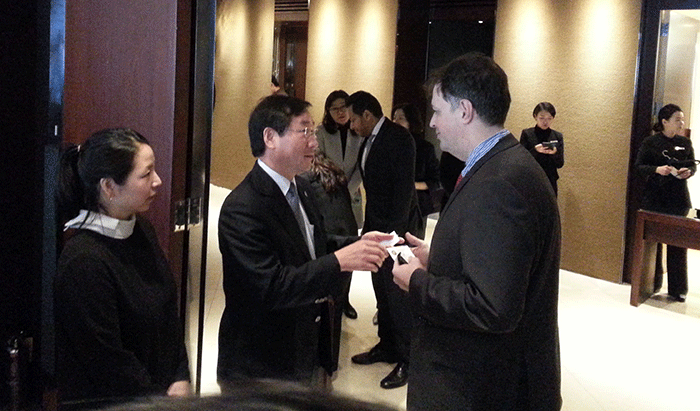
The GAK meeting was attended by an estimated total of 130 representatives from the Korean local autonomous organizations and foreign missions in Korea, including an estimated total of over 60 foreign mission chiefs, among them Ambassadors Michel Idiaquez Baradat of Honduras, Mark Lippert of the United States, Fabien Penone of France and Koro Bessho of Japan. (See partial list at the end of this Article.)
In response to Mayor Yoo’s welcome remarks, Ambassador Idiaquez Baradat of Honduras said on behalf of the Seoul Diplomatic Corps as well as for himself that the local governments are gradually gaining importance in the country since the local governments that grow based on flexibility and diversity have the capability to understand and meet the needs of different groups of people.
“For this reason,” he said, “I believe that the improvement in regional competitiveness will certainly take Korea to the next level.” Then he said, “I would like to remark that the relation between the Diplomatic Corps in Seoul and the Governors Association of Korea (GAOK) could be strengthened by organizing various sports, artistic and cultural exchange activities.” (See excerpts after the end of Mayor Lee's speech.)
Ambassador Lippert of the US in Seoul stands out from his predecessors in many respects. Offhand, he speaks very good Korean and had his first son was born in Korea (wherefore he is adorably called ‘Made in Korea’ among Koreans). Ambassador Lippert gave his son a Korean name, Sejun (meaning “to be clean and have great talent and insight”), frequently wears Hanbok Korean dresses and invites guests to a Korean-style party. Many Koreans who know him say that he means when he says, “I am happy to be in Korea.”
They believe that Ambassador Lippert is in Korea in a very difficult time when the US appears to be getting closer to Japan than to Korea and Korea appearing to be getting closer to China compared with the preceding governments.
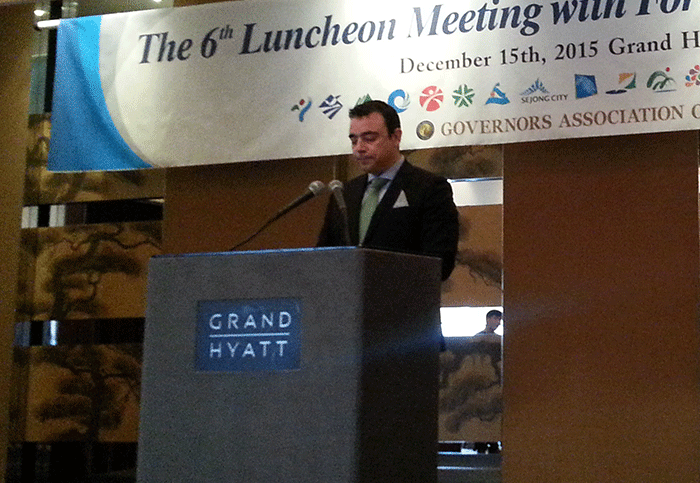
Many Koreans believe that Korea is lucky to have a ‘pro-Korean’ US ambassador in Korea under these difficult circumstances and that they should try to help all they can in his effort to keep Korea and his county in the best shape of friendship.
Lippert speaks very good Korean, and naturally has many good Korean friends considering the relatively short of period of his time in Korea.
The GAOK was formed in Korea six years ago among the different local autonomous organizations to enhance their cooperation among them by discussing matters of common interest and to contribute to the balanced development of the regional societies as well as foster appropriate local autonomy.
They also seek to promote innovation in the international competiveness of local governments, promote mutual cooperative leadership among the mayors and governors of the provinces, cities and counties.
Among the major activities of the GAOK are cooperation between the central and local governments, sharing of joint-correspondence concerning current issues of the local governments, performing of policy researches, supporting international exchange and cooperation of local governments and dispatching local public officials to Korean missions overseas.
This year marks the 6th anniversary of the "Luncheon Meeting with Foreign Mission Chiefs in Korea," which was first held in 2010.
At the meeting, representatives of the different local governments showed videos and made presentations introducing their localities and international events to be hosted by them this year.
Excerpts from the welcome speech by Mayor Yoo Jeong-bok of the Incheon Metrpolitan City:
H.E. Michel Idiaquez Baradat, Honduras Ambassador to Korea, ambassadors, representatives from foreign missions in Korea, and ladies and gentlemen, I am Yoo Jeong-bok, Mayor of Incheon Metropolitan City, serving as the President of the Governors Association of Korea.
I extend my warm welcome to all of you here at the "2015 Luncheon Meeting with Foreign Mission Chiefs in Korea," hosted by the Governors Association of Korea.
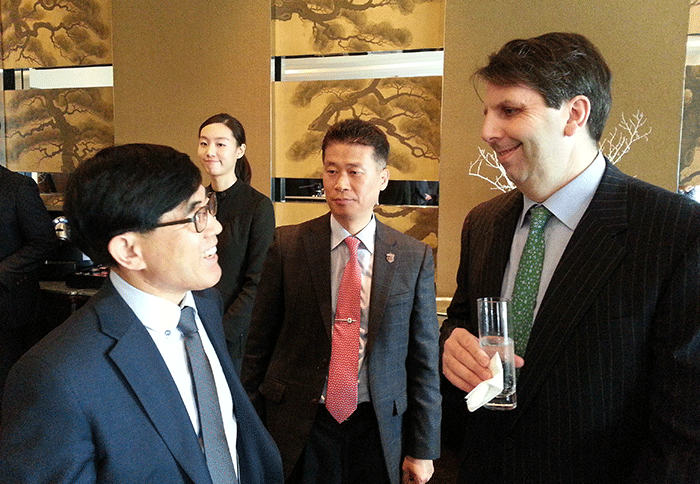
Before I go on, I would like to extend my condolences to the nation of France, who has recently gone through terrorist attacks.
Please remember that we are all praying for the country.
The Governors Association of Korea was established in 1999 to promote exchanges and cooperation among local administrative units and to facilitate discussion about matters of common interest.
Ever since its establishment, the Association has been exerting its full efforts to contribute to the sound development of local autonomies and their global exchanges.
This year marks the 6th anniversary of the "Luncheon Meeting with Foreign Mission Chiefs in Korea," which was first held in 2010.
The Association has been contributing greatly to the exchanges and cooperation between Korea's local governments and those of other countries by establishing a close network with foreign missions in Korea.
I would like to take this opportunity to extend my gratitude to all of you for your interest and support.
Currently, Korea's 232 local autonomies are actively pursuing global cooperation by establishing friendly relations with 1,089 local autonomies over 73 nations, and the level of cooperation is increasing.
The Korea Heart to Heart Program, which invites foreign civil servants to Korea for training, is a good example of such global cooperation.
Over 13 nations including those in Asia, Central and South America, Europe and Africa are participating in the program, and the number of countries is increasing annually.
As the level of global exchanges of Korea's local governments increases, the role of the Association is also increasing.
Your support is needed for the Association to successfully support local governments' international affairs.
I hope you will never lose interest in the exchanges and cooperation between Korea's local autonomies and those of your nations.
I wish you all the best and hope the year 2016 will be filled with hope and happiness.
Excerpts from the congratulatory remarks of Ambassador Idiaquez Baradat of Honduras:
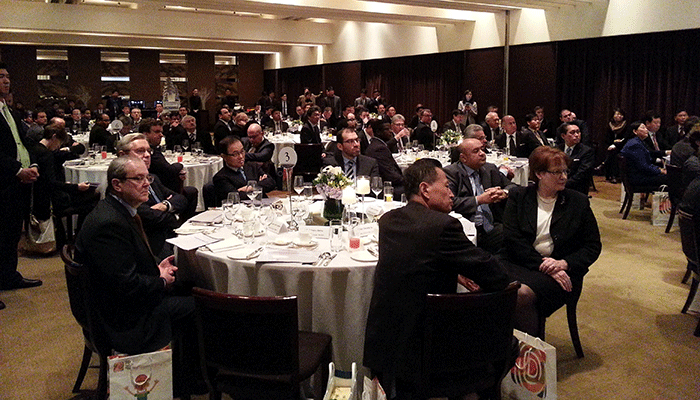
It is my privilege to convey to the Honorable Mr. Yoon Jeong-bok, President of the Governors Association of Korea (GAOK) and Mayor of Incheon my gratitude for the invitation to take part of this meaningful event to commemorate the "6th Glocalization meeting with Foreign Missions in Korea," as it is being celebrated to highlight the efforts and achievements in the area of local level international cooperative works of the Governors Association of Korea (GAOK), which is a body composed of mayors and governors of the 17 metropolis and regional provinces with the objectives to balance regional society and foster enhanced autonomy of the 243 Korean local governments.
According to the United Nations Development Programme (UNDP), it uses the term ‘decentralizing governance’ as it firmly believes that decentralization of the public sector, in itself, will not be effective unless support is also provided to strengthen local governance, involving the public, private and civil sectors. And, in turn, the achievement of good "governance at the local level is also not possible without the transfer of responsibilities and capacities through decentralization.
Though local autonomy systems have been strengthened over the past 20 years, Korea is still a central government-driven society. A central government-led development approach inherently has uniformity and may delay responses to a rapidly changing world.
Local governments are gradually gaining importance in the country since local governments that grow based upon flexibility and diversity have the capability to understand and meet the needs of different groups of people. For this reason, I believe that the improvement in regional competitiveness will certainly take Korea to the next level.
I would like to remark that the relation between the Diplomatic Corps in Seoul and the Governors Association of Korea (GAOK) could be strengthened by organizing various sports, artistic and cultural exchange activities.
Moreover, these exchanges can be reinforced with the support of the Glocalization Office which has the function of assisting the internationalization of the local governments in areas of sister city, public official exchange program and overseas training, to name a few.
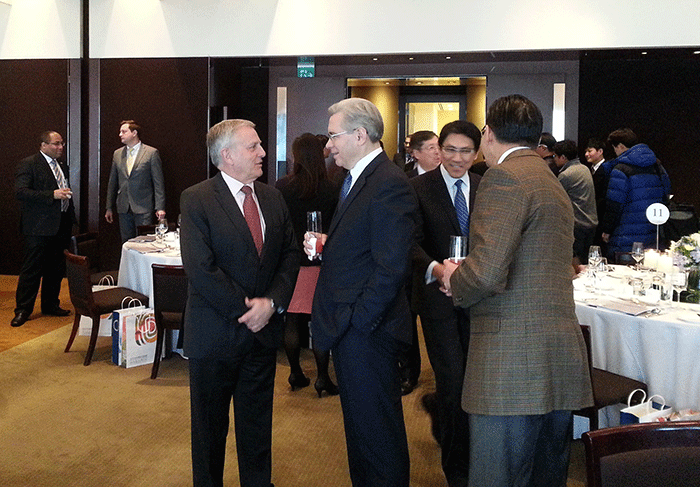
In this regard, it is my belief that the Governors Association of Korea (GAOK) can count on full support from us, the Diplomatic Corps in Seoul, to achieve the objective of promoting mutual cooperation and interaction among cities and regional provinces and the purpose of providing solutions to common difficulties and problems faced by local governments, contributing to a balanced development of the local cities and provinces as well as establishing the foundations for healthy and prosperous local governments.
To conclude, I would like to wish you all a very Merry Christmas in advance and all the best for the coming New Year 2016.
Partial list of participating heads of diplomatic missions:
Ambassadors William Paterson of Australia, Ramzi Teymurov of Azerbaijan, Md. Zulfiqur Rahman of Bangladesh, Natallia Jhylevich of Belarus, Guadalupe Palomeque de Taboada of Bolivia, Francois Bontemps of Belgium, Dato Paduka Haji Modh Rosli Bin Haji Sabtu of Brunei Darussalam , Jario Lopez of Costa Rica (CDA), Sylvestre Kouassi Bile of Cote d'Ivoire, Oscar Gustavo Herrera Gilbert of Ecuador, Hany Moawad Selim Labib of Egypt, Matti Heimonen of Finland, Fabien Penone of France, Nikoloz Apkhazava of Georgia, Dionisios Sourvanos of Greece, Gustavo Adolfo Lopez Calderon of Guatemala, Michel Idiaquez Baradat of Honduras, Gabor Csaba of Hungary, Vikram Kumar Doraiswami of India, Bessho Koro of Japan, Jasem Mohamed Albudaiwi of Kuwait, Dato Rohana binti Ramli of Malaysia, Mohammed Chraibi of Morocco, Myo Taant Pe of Myanmar (CDA), Clare Patricia Fearnley of New Zealand, Zahid Nasrulah Khan of Pakistan, Raul S. Hernandez of the Philippines, Krzysztof Majka of Poland, Mohammed Bin Abdalla Obaid Al-Dohaimi of Qatar, Alexander Andreevich Tomonin of Russia, Zoran Kazazovic of Serbia, Niroshani Manisha Dias Abeywickrema Gunasekera of Sri Lanka, Joerg Alois Reding of Switzerland, Mohamed Ali Nafti of Tunisia, Hakan Okcal of Turkey, Vasyl Marmazov of Ukraine, Mark W. Lippert of the United States of America, Deputy Head of Mission Bakhtiyor Ibragimov of Uzbekistan of Uzbekistan.

